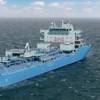According to Dubai’s Gulf News, excess capacity in the global fleet of liquefied natural gas carriers will be at its highest this decade in 2008, due to a growing, worldwide fleet causing lower utilization rates and it is predicted by analysts that utilization of the LNG fleet will fall to 77.4 percent in 2008, almost 13 percentage points lower than at the beginning of the decade. Demand for LNG tankers has deteriorated markedly as a result of a large increase in fleet supply partly caused by speculative orders for new ships. Falling utilization is hurting revenue for companies such as Oslo-based Bergesen Worldwide Gas ASA and Golar LNG of Hamilton, Bermuda while rising earnings for operating LNG tankers have encouraged some shipowners to order vessels without first having them assigned to particular projects. Analysts also report that improved productivity in the existing fleet has added to the surplus capacity. The growth in the surplus is already slowing because supply disruption from Indonesia is forcing Japan, the world's largest LNG importer, to source shipments from further away, tying up ships for longer periods. The global fleet of LNG carriers will expand 16 percent by the first quarter of 2007. (Source: Gulf News)
Sponsored Content
Innovative Hull Maintenance: Profitable & Green

Subscribe for
Maritime Reporter E-News
Maritime Reporter E-News is the maritime industry's largest circulation and most authoritative ENews Service, delivered to your Email five times per week












